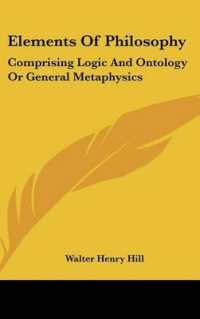Full Description
Resource Rich Muslim Countries and Islamic Institutional Reforms explores the "resource curse," a condition in which a country's abundance of natural resources is negatively linked with the country's development and economic growth, in resource rich Muslim countries. The resource curse puzzle has been studied for over twenty years, with prior researchers looking to prove its existence and explore its causes. Recent studies have begun to indicate institutional failure as a likely cause of the curse, as wealth of resources tends to cause counterproductive behaviors such as rent-seeking, patronage and corruption. The subpar economic performance of resource rich Muslim countries in the Organization of the Islamic Cooperation (OIC) could be attributed to the manifestation of a resource curse. Collectively, the member countries of the OIC contribute over 9% of the world's total GDP with 22.8% of the world's population. Saudi Arabia and the United Arab Emirates alone contribute about 17% of world oil production. Resource rich Muslim countries should be at the forefront of economic performance and growth, yet we see the opposite when we compare the performance of these countries to countries that are not resource rich (such as Spain, France, Hong Kong and Japan). Through an analysis of sample countries, the authors have discovered that natural resources exert a drag on the countries' economic growth, thereby indicating the presence of the resource curse. Their research also found weaknesses in the quality of institutions as the cause of the curse. To counteract the negative effects of the resource curse in resource rich Muslim countries, the authors provide a number of Islamic institutional reforms.
Contents
Illustrations - Latifah Merican Cheong: Foreword - Preface - Acknowledgments - Abbreviations - The OIC Countries - The Resource Curse—Theory, Explanations and its Reversal - Resource Curse in OIC Countries: The Role of Institutions - Theories of Institutions - Addressing the Resource Curse through an Ideal Islamic Institutional Framework - Policy Assessment: Saudi Arabia, Malaysia and Qatar - Summary, Conclusions and Looking Ahead - Index.







